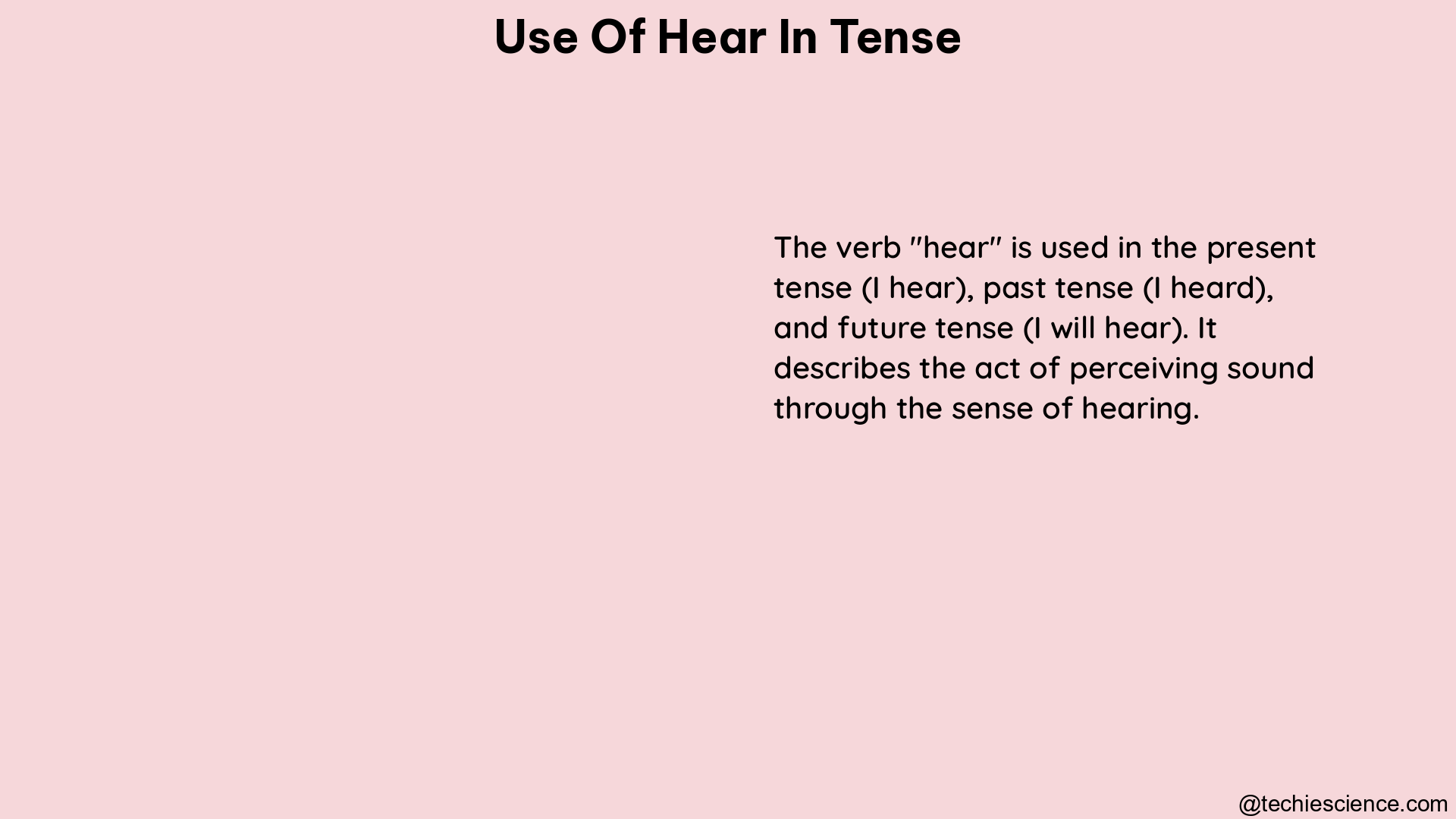The English language is a rich and complex tapestry, with verbs playing a crucial role in conveying meaning and nuance. One such verb that often perplexes language learners is “hear,” as its usage can vary significantly across different tenses. In this comprehensive guide, we will delve into the intricate details of using “hear” in various tense forms, providing you with a thorough understanding of this essential verb.
Infinitive Form
The infinitive form of the verb “hear” is simply “hear.” This form is used when the verb is not conjugated and appears in its basic, unconjugated state. For example, “I hear someone has a birthday coming up” uses the infinitive form of the verb.
Present Tense

Simple Present Tense
In the simple present tense, the verb “hear” remains unchanged: “I hear.”
Present Continuous Tense
The present continuous tense of “hear” is formed by using the present participle “hearing”: “I am hearing someone has a birthday coming up.”
Present Perfect Tense
The present perfect tense of “hear” is constructed using the auxiliary verb “have” and the past participle “heard”: “I have heard someone has a birthday coming up.”
Present Perfect Continuous Tense
The present perfect continuous tense of “hear” combines the present perfect tense with the present participle: “I have been hearing someone has a birthday coming up.”
Past Tense
Simple Past Tense
The simple past tense of “hear” is “heard”: “I heard someone has a birthday coming up.”
Past Continuous Tense
The past continuous tense of “hear” is formed by using the past tense of the auxiliary verb “be” and the present participle “hearing”: “I was hearing someone has a birthday coming up.”
Past Perfect Tense
The past perfect tense of “hear” is constructed using the past tense of the auxiliary verb “have” and the past participle “heard”: “I had heard someone has a birthday coming up.”
Past Perfect Continuous Tense
The past perfect continuous tense of “hear” combines the past perfect tense with the present participle: “I had been hearing someone has a birthday coming up.”
Future Tense
Simple Future Tense
The simple future tense of “hear” is formed using the auxiliary verb “will” and the infinitive “hear”: “I will hear someone has a birthday coming up.”
Future Continuous Tense
The future continuous tense of “hear” uses the auxiliary verb “will,” the present participle “be,” and the present participle “hearing”: “I will be hearing someone has a birthday coming up.”
Future Perfect Tense
The future perfect tense of “hear” is constructed using the auxiliary verb “will,” the past participle “have,” and the past participle “heard”: “I will have heard someone has a birthday coming up.”
Future Perfect Continuous Tense
The future perfect continuous tense of “hear” combines the future perfect tense with the present participle: “I will have been hearing someone has a birthday coming up.”
Idiomatic Usage
In addition to the standard tense forms, the verb “hear” can be used idiomatically in the present tense to convey information received in the past. For example, “I hear Sarah won some money” means “I was told that Sarah won some money.”
Examples
- Simple Past Tense: “He heard the teacher call but ran out the door anyway.”
- Present Continuous Tense: “I am hearing someone has a birthday coming up.”
- Past Perfect Tense: “I had heard someone has a birthday coming up.”
References
- https://homework.study.com/explanation/what-is-the-past-tense-of-hear.html
- https://www.usingenglish.com/forum/threads/hears-is-hearing.240971/
- https://www.wordreference.com/conj/enverbs.aspx?v=hear
- https://english.stackexchange.com/questions/399795/why-do-we-use-hear-in-a-present-time-in-a-sentence-with-a-past-meaning
- https://grammarbrain.com/past-tense-of-hear/
Hey! I am Arpita Bose Roy. My qualifications are M.A. in English with B. Ed. in both general education and special education. I have 2 years of experience as a “language analyst” at IIT Kharagpur and 4 years of experience as an “Academic Content Developer” at IIT Kharagpur. Currently, I am working as an academic writer at Lambdageeks.